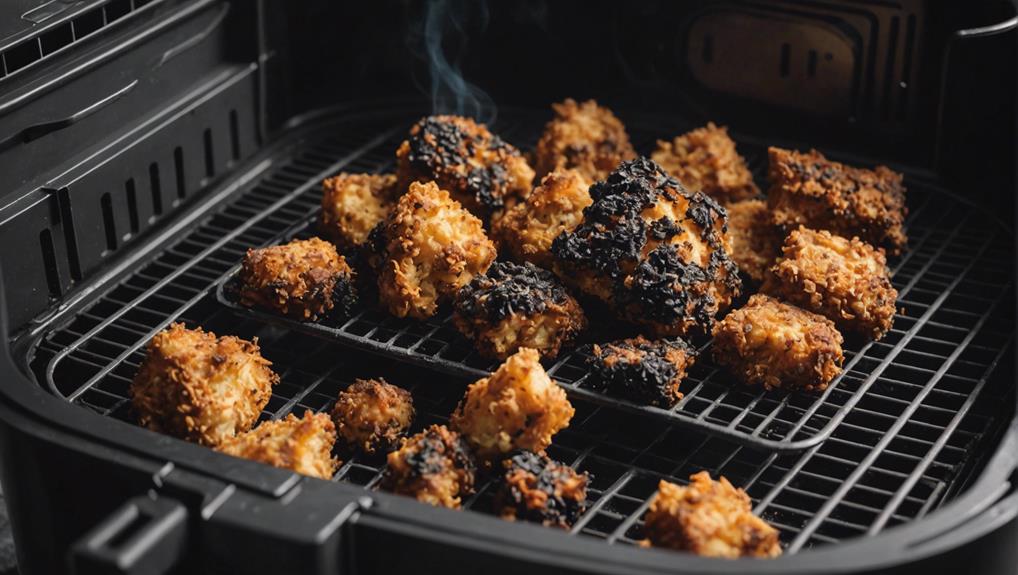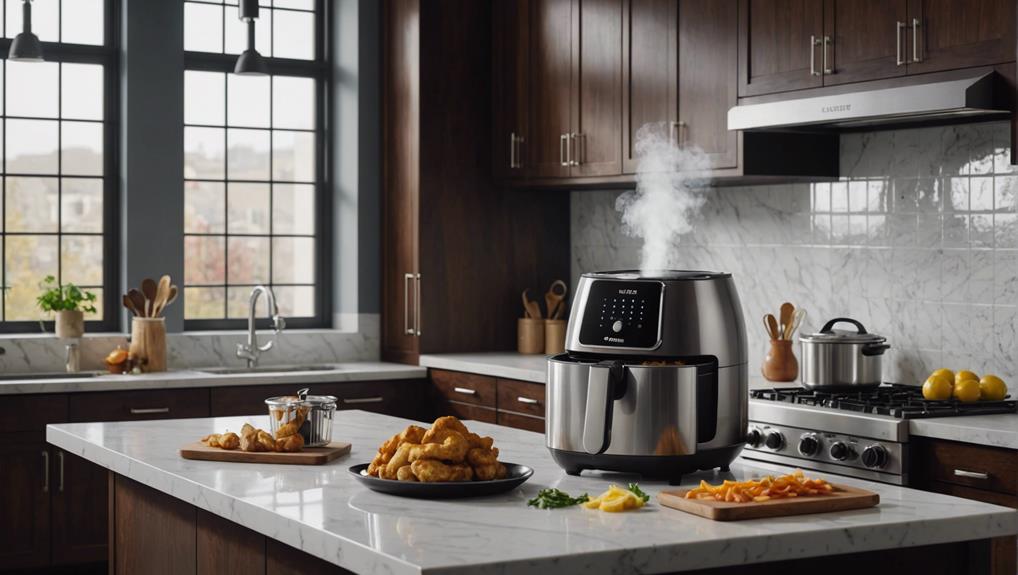Your air fryer smokes due to several reasons, often tied to how you're using and maintaining it. For first-time use, smoke can result from the protective coating burning off. Excess oil or grease from foods can lead to smoke, so use high-quality oil and clean regularly. Food residue or loose particles burning on the heating element is another common cause. Overfilling the basket restricts air circulation, causing splattering and smoke. Guarantee proper placement and ventilation to prevent smoke buildup. Properly addressing these factors will help you avoid future issues and enhance your air frying experience. Learn more to master your device.
Key Takeaways
- Protective coating may cause smoke during the first use; ventilate the area.
- Excess oil or grease from greasy foods can lead to smoking issues.
- Food residue on the heating element can burn and produce smoke.
- Overfilling the basket restricts air circulation, causing uneven cooking and smoke.
- Inadequate ventilation or improper placement can cause smoke buildup.
First Time Use
When you first use your air fryer, expect some smoke as the manufacturer's protective coating burns off. This initial smoking is normal and should only last a few minutes. To manage this, you should prepare by opening windows and turning on ventilation systems. This will help clear the smoke quickly and guarantee your kitchen remains safe and comfortable.
To further mitigate the initial smoking, consider running the air fryer empty for a few minutes before cooking any food. This can help burn off the manufacturer's protective coating more effectively and minimize smoke production during your first use. It's a simple step that can save you from unnecessary concerns.
However, if the smoking persists beyond the first use, it could indicate an issue that requires troubleshooting. Persistent smoke might be a sign of a more significant problem, such as residual coating or a malfunction within the unit. In such cases, consult the user manual or contact customer support for guidance.
Excess Oil or Grease
Excess oil or grease in your air fryer can lead to significant smoking issues, posing both a safety risk and an unpleasant cooking experience. When you're cooking fatty foods, the released grease and splatter can make contact with the heating element, causing it to burn and produce smoke. This phenomenon can quickly turn your air fryer into a smoking hazard.
To prevent smoke, first be mindful of the types of foods you're preparing. Greasy foods like bacon or fatty cuts of meat are more likely to create excess grease. Using high-quality oil with a high smoke point can also mitigate this issue. Oils like avocado or peanut oil are less likely to burn and cause smoking.
Regular maintenance is essential. Make sure to clean your air fryer thoroughly after each use to remove any food residue and excess grease. This practice not only prevents a smoking air fryer but also extends the lifespan of your appliance. If you notice persistent smoking, it could be a sign of grease buildup that needs immediate attention.
Food Residue and Particles

Food residue and particles left in your air fryer can quickly accumulate and burn on the heating element, causing smoke and an unpleasant cooking experience. When you prepare foods with loose breading or batter, these particles can detach and circulate within the air fryer. As they come into contact with the heating element, they burn, producing smoke. Additionally, excess grease from fatty foods can splatter onto the heating element and burn, contributing to the smoking issue.
To prevent these problems, it's important to clean your air fryer regularly. Make sure you remove all food residue and particles after each use. Pay particular attention to any grease buildup on the heating element, as this can be a significant source of smoke. Investing a few minutes in proper maintenance can save you from the frustration of a smoking air fryer and extend the lifespan of your appliance.
Overfilled Basket
To guarantee proper air fryer basket restricts proper air circulation, causing uneven cooking and smoke production. When you pack too much food into the basket, the hot air can't circulate effectively around each item. This restriction leads to uneven cooking, where some pieces are undercooked while others are overcooked. The lack of ideal air circulation also contributes to smoke, as the hot air struggles to flow smoothly.
An overfilled basket can cause oil splattering, which is another culprit for smoke. When oil splatters from overcrowded food, it can reach the heating element. Once the oil makes contact, it burns and produces smoke. This not only affects the air fryer's performance but can also impact the taste and quality of your food.
To prevent smoke, avoid filling the basket beyond its recommended capacity. Overcrowding increases the chances of food touching the heating element, exacerbating smoke production. By adhering to the basket's capacity guidelines, you guarantee that hot air circulates freely, minimizing the risk of oil splattering and producing smoke. Ideal air circulation is key to achieving evenly cooked, delicious results without the unwanted side effect of smoke.
Placement and Ventilation

Proper placement and ensuring adequate ventilation are critical steps to prevent your air fryer from producing smoke. Start by placing your air fryer on a stable, level surface to avoid any rocking or tilting that could lead to uneven cooking and smoke. Ensure it's positioned away from walls and flammable materials to avoid any fire hazards and to allow good airflow around the appliance.
Adequate ventilation is essential. Use your air fryer in a well-ventilated area, preferably near a window or an exhaust fan to help disperse any smoke. This not only helps in reducing smoke but also prevents your kitchen from getting smoky and setting off alarms.
To further reduce smoking, consider placing a slice of bread or a small amount of water in the bottom of the air fryer. The bread can absorb excess grease, while the water can prevent fat drippings from burning. These small adjustments can significantly minimize smoke production.
Cooking Times and Temperatures
Guaranteeing your air fryer operates smoke-free also depends on mastering the correct cooking times and temperatures for various foods. Cooking at excessively high temperatures, especially for fatty foods, is a common culprit for air fryer smoke. To prevent smoke, you need to follow the recommended cooking times and temperatures provided in your air fryer manual. These guidelines are designed to minimize the risk of smoking issues.
Adjust cooking times and temperatures based on the type of food you're preparing. For example, fatty foods like bacon or sausages may require lower temperatures to reduce the likelihood of smoke. Overcrowding the air fryer basket is another factor that can lead to uneven cooking and increased smoke. Ensure proper spacing between items to allow hot air to circulate freely.
Monitoring cooking times closely is essential. Foods can cook more quickly in an air fryer, so adjust cooking times as needed to avoid burning or overcooking, which can also cause smoke. By being vigilant and making the necessary adjustments, you can effectively prevent smoke and achieve excellent results with your air fryer.
Frequently Asked Questions
How Do I Stop My Air Fryer From Smoking?
To stop your air fryer from smoking, address oil splatter and grease buildup by cleaning food residue, maintaining proper air circulation, avoiding basket overcrowding, adjusting cooking temperature, ensuring fan maintenance, checking heat settings, and resolving ventilation issues.
Is Smoke Supposed to Come Out of the Air Fryer?
No, smoke isn't supposed to come out of your air fryer. Studies show 30% of smoking issues arise from inadequate air fryer placement. Guarantee proper ventilation, clean food residue, manage cooking temperature, avoid excess grease, and maintain air circulation.
How Do I Clean My Air Fryer so It Doesn't Smoke?
To clean your air fryer and prevent smoke, follow a proper disassembly process. Soak the cleaning basket in a vinegar solution or use baking soda. Employ non-abrasive sponges and cleaning tools. Establish a regular cleaning schedule and dry thoroughly.
Why Does My Air Fryer Smoke When I Cook Bacon?
When you cook bacon, fat splatters and bacon grease can cause smoke due to high cooking temperatures and grease buildup. Avoid airflow issues and an overcrowded basket by using lean bacon, adjusting cooking duration, and cleaning the drip tray.
Conclusion
By understanding why your air fryer smokes, you'll be able to troubleshoot and resolve the issue like a pro. Just like a well-oiled machine, keeping your air fryer clean and using it correctly guarantees peak performance. Don't let excess oil, food residue, or improper placement cloud your cooking experience. Follow these guidelines, and your air fryer will deliver delicious, smoke-free results every time. Now, go ahead and fry with confidence!
Disclosure: As an Amazon Associate, I earn from qualifying purchases.



